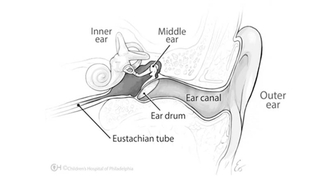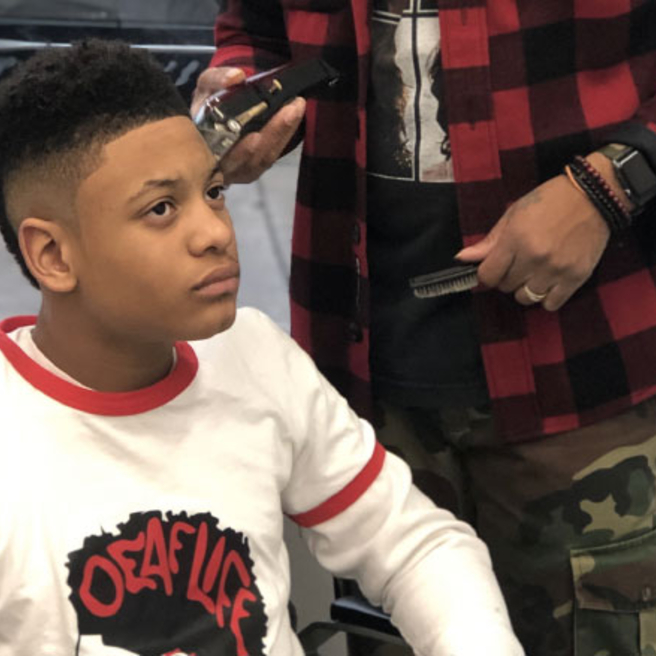What is hearing loss?
About 2 to 3 out of every 1,000 children have hearing loss in one ear (unilateral) or both ears (bilateral) at birth. Early detection and management of hearing loss are very important and will help a child stay on track with developmental milestones.
The hearing and listening parts of the brain depend on consistent access to sounds and voices in the environment in order for a child to best develop speech and language, learn, and socialize. Hearing loss can be caused by conditions that affect any part of the ear and can interrupt or limit the brain’s access to sound and ability to understand speech. Learn more about how we hear.
Signs and symptoms of hearing loss
You might be concerned that your child has a hearing loss if they:
- Does not respond to sounds and voices — or stops responding consistently
- Is not meeting age — appropriate speech and language milestones
- Has frequent middle ear infections and/or middle ear fluid
- Turns up the volume of music or television
- Says “what?” a lot and needs information or requests repeated
Possible causes of hearing loss (present at birth or acquired)
- Family history of permanent childhood hearing loss
- Genetic syndrome associated with hearing loss
- Anatomic differences in development of part(s) of the ear
- Craniofacial abnormality
- Infections at or before birth, such as cytomegalovirus (CMV)
- Hyperbilirubinemia
- Hypoxic events (brain does not receive enough oxygen)
- History of extracorporeal membrane oxygenation (ECMO) therapy
- History of ototoxic medications
- Conditions requiring a neonatal intensive care stay of greater than five days
- Head trauma
- Meningitis
- Exposure to loud sounds — especially through earphones
- Diseases of the middle or inner ear
Types of hearing loss
The ear is divided into three major parts:
- Outer ear - pinna (the part that can be seen) and ear canal
- Middle ear - eardrum, ossicles (three bones) and the Eustachian tube (narrow tube that connects the middle ear to the throat)
- Inner ear - cochlea (hearing organ), and balance system

Conductive – hearing problem caused by condition affecting the outer and/or middle ear. This type of hearing loss is more likely to respond to medical or surgical treatment and may be temporary or permanent.
Sensorineural – hearing problem caused by condition affecting the inner ear. This type of hearing loss is usually permanent.
Mixed – hearing problem caused by a condition affecting both the outer and/or middle ear and the inner ear.
Neural – hearing problem where the ear detects sound normally but has difficulty sending the information to the brain.
Testing for hearing loss
At Children’s Hospital of Philadelphia, audiologists conduct comprehensive hearing evaluations for children from birth until early adulthood. Learn more about each of the hearing tests your child may receive and what to expect at your appointment. The results of a child’s hearing test are typically recorded on an audiogram. An audiogram is a graph of the softest level that a child can hear different pitches or frequencies (Hz). Your child’s audiologist will explain the results of your child’s hearing test at their appointment and will discuss if further testing or treatment is recommended.
Treatment for hearing loss
If a hearing loss is found, a multidisciplinary team of specialists will provide you with appropriate resources, intervention services, and ongoing follow-up care. This team includes audiologists and speech-language pathologists to evaluate communication skills, as well as integrated psychosocial specialists to support healthy adjustment to hearing loss. Otolaryngologists (ear, nose and throat specialists) will check your child’s ears to make sure that other conditions such as ear wax or middle ear fluid are not contributing to your child’s hearing loss. The doctor may order other tests to see if the cause of the hearing loss can be found. The ENT doctor will also need to sign a medical clearance form if your child is getting a hearing device.
Your audiologist may also recommend evaluations with the following specialists:
- Genetics: A genetics specialist can look for the cause of a child’s hearing loss — there are more than 150 genes whose mutations can cause hearing loss — and if there are any other related medical conditions. They may also suggest that other family members have their hearing tested. If your child has an otoferlin gene (OTOF)-mediated hearing loss, they may be eligible for a gene therapy CHOP is offering as part of an experimental therapy trial. Learn more about this breakthrough treatment.
- Ophthalmology (eye specialist): Children with hearing loss rely on their eyesight to help them. It is important to have your child’s eyes checked. If they have vision problems, the specialist will suggest ways to improve this.
- Developmental skills: A psychologist or developmental and behavioral pediatrician can assess your child’s development and school performance. The results will help you to understand your child’s ability to learn and is useful in creating your child’s educational plan.
- Early Intervention (EI): If your child is younger than 5 years of age, they should be evaluated by your local early intervention program. This program is available to your child in your community. They may test your child and recommend services to stimulate speech and language development. They may simply want to monitor your child and track their development.
- Other: Some children also benefit from seeing a neurologist or a physical or occupational therapist. Sometimes families see a social worker to help them find resources or other support for their child. Some children with hearing loss also have dizziness or balance problems. Your child may be referred for a comprehensive multidisciplinary evaluation with CHOP's Balance and Vestibular Program.
Hearing devices for children
Some children who are diagnosed with hearing loss benefit from being fit with a hearing device (such as a hearing aid, bone conduction hearing device or cochlear implant). Learn more about hearing devices for children with hearing loss.
Resources to help
Hearing Loss in Children Resources
Department of Audiology Resources
We have created resources to help you find answers to your questions about hearing loss and assistive devices so you can feel confident in the care you are providing your child.
Reviewed by Danielle Leisner, AuD, CCC-A, Sarah McKay, AuD, CCC-A


